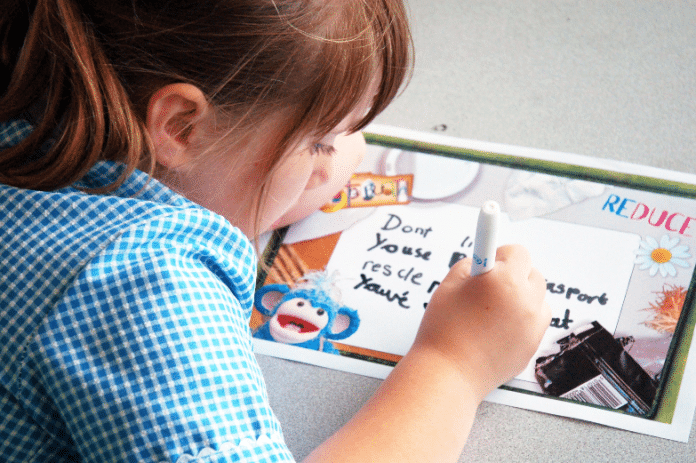“Water is humanity’s lifeblood […] But water is in deep trouble.” This was the stark warning delivered by United Nations Secretary-General António Guterres as he opened the UN 2023 Water Conference last week in New York.
Marine litter and plastic are polluting the world’s oceans and, without meaningful action, emissions of plastic waste into aquatic ecosystems are projected to nearly triple by 2040.
Zero-waste initiatives are essential to combat plastic pollution, and as the UN marks the first-ever International Day of Zero Waste on 30 March 2023, UNRIC spoke with UK-based environmental education programme Wastebuster. It has become one of the largest, free online education programmes in the world, working with over 24,000 schools in 94 countries to inspire children to care for environment.
A wake-up call

Underwater photographer and founder of Wastebuster Katy Newnham was driven to create the organisation after witnessing what she describes as an “atrocity” under the sea.
When El Niño – a weather pattern that has a warming effect on average global surface temperatures – bleached large swathes of the Great Barrier Reef in 2004, Newnham began to comprehend the “fragility of the eco-systems on which all life depends”.
“Once bursting with colour and marine life, the reefs had become graveyards of dying corals,” she details.
Newnham also witnessed coast lines, islands and reefs blighted by litter and plastic pollution.
“I have seen turtles trying to eat plastic bags, mistaking them for jellyfish. Seals, fish, and sea birds ingesting or entangled in plastic from recognisable consumer products,” she says, adding she sometimes saw plastic as deep as 30m underwater.
The picture-perfect content she was taking as a photographer for adverts did not portray the reality of the situation. Feeling a “guilt, mixed with outrage,” she was spurred to create Wastebuster in 2006.

Education is key
Wastebuster produces educational resources for schools and families that promote responsible consumption and production, including videos, ready-made assemblies and classroom activities.
“It is important children understand that when they throw something away, there is no such thing as ‘away’ – it is going to go somewhere,” Newnham explains, adding that their campaigns reach over five million children and their families.
The activities are intended to play an important role in a child’s personal development. Activities include tips on how to turn a plastic bottle into a bird feeder or a watering can.
By promoting responsible production and consumption from an early age, Newnham hopes children will automatically incorporate these values into how they live, work and play.
The power of storytelling
Addressing such a serious topic with children is not always easy. For Newnham, it all comes down to how you tell the story.
“Storytelling has the power to connect and make challenging or abstract concepts such as ‘caring for the environment’ relatable and engaging,” she says. By completing simple waste-busting activities at school and at home, children can become “the hero of their own story”.
Wastebuster’s films take children on a journey of discovery, to see why protecting the planet is important and how they can make change happen. Videos with colourful characters, for example, share insights into what happens in a recycling factory and which types of plastic can be recycled.
“This can help combat anxiety, a sense of hopelessness, disconnection, or apathy when young people begin to comprehend the scale of some of the greatest environmental challenges of our time.”
Schools are listening
Over the last 15 years, Newnham has seen significant changes in how waste and sustainability are addressed in schools. With climate change spoken about in the media, children are looking for answers.
“Children are more aware, more motivated, and more curious,” Newnham notes.
Schools are also looking to improve their environmental performance and integrate environmental education into the curriculum.
Recycling rewards initiatives, such as Wastebuster’s Recycle to Read project, have been particularly popular among schools as they support their fundraising efforts and engage the local community. The campaign encourages the public to recycle toys, small tech and textiles to gain reward points which can be exchanged for books and magazine subscriptions.
Wastebuster Water Week 2024

Last week’s UN 2023 Water Conference closed with the adoption of the Water Action Agenda, an action plan containing almost 700 commitments to protect water.
Newnham was able to attend and was struck by the “energy of the conversations and the panel discussions and declared commitments” at the historic conference. It “felt so much more than a ‘business-as-usual’ event. It felt like it was uniting the world as a global community, to explore how together we can protect and secure water, for people and for planet”, she says.
Inspired by the conference and the UN’s Water Action Decade, Wastebuster is organising a waste-busting water week in 2024.
The week-long event will focus on decoding the science that links plastic waste to water pollution. Through short films and a global webinar, the charity will tackle common misconceptions about plastic water pollution and help young people understand how they can prevent it.
Throughout the week, Wastebuster will also ask ambassadors, celebrities, businesses, schools and children to make one million pledges to prevent water pollution worldwide.
A few tips from Wastebuster to reduce plastic pollution
- Don’t dispose of plastic items such as wet wipes, ear buds or sanitary products in the toilet
- Use reusable packaging
- Avoid products excessively packaged in plastics
- Don’t put items in overflowing bins in public places, which can become litter
- Use alternatives to plastics, where practical
- Educate your family with these key messages
Read more:
- UN Water Conference: “We need to understand, value and manage water better
- Water Action: Where does the rain go in a city?
The inclusion of an organisation on the United Nations Regional Information Centre (UNRIC) website does not necessarily reflect the views of UNRIC and does not imply its endorsement.




